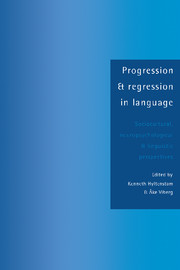 Progression and Regression in Language
Progression and Regression in Language Book contents
- Frontmatter
- Contents
- List of contributors
- Preface
- INTRODUCTION
- THE SOCIOCULTURAL SETTING
- PSYCHO- AND NEUROLINGUISTIC ASPECTS
- THE LINGUISTIC PERSPECTIVE 1: DISCOURSE, GRAMMAR, AND LEXIS
- 10 Crosslinguistic perspectives on native language acquisition
- 11 Syntactic development in Danish L2
- 12 The weaker language in bilingual Swedish-French children
- 13 Four operating principles and input distribution as explanations for underdeveloped and mature morphological systems
- 14 Crosslinguistic perspectives on lexical organization and lexical progression
- 15 Attrition or expansion? Changes in the lexicon of Finnish and American adult bilinguals in Sweden
- THE LINGUISTIC PERSPECTIVE 2: PHONOLOGY
- Index
13 - Four operating principles and input distribution as explanations for underdeveloped and mature morphological systems
Published online by Cambridge University Press: 06 July 2010
- Frontmatter
- Contents
- List of contributors
- Preface
- INTRODUCTION
- THE SOCIOCULTURAL SETTING
- PSYCHO- AND NEUROLINGUISTIC ASPECTS
- THE LINGUISTIC PERSPECTIVE 1: DISCOURSE, GRAMMAR, AND LEXIS
- 10 Crosslinguistic perspectives on native language acquisition
- 11 Syntactic development in Danish L2
- 12 The weaker language in bilingual Swedish-French children
- 13 Four operating principles and input distribution as explanations for underdeveloped and mature morphological systems
- 14 Crosslinguistic perspectives on lexical organization and lexical progression
- 15 Attrition or expansion? Changes in the lexicon of Finnish and American adult bilinguals in Sweden
- THE LINGUISTIC PERSPECTIVE 2: PHONOLOGY
- Index
Summary
INTRODUCTION
Background
After a series of reports on the study of the acquisition of Spanish by English-speaking children and adults, in which I began to describe and seek explanations for the linguistic characteristics of these learners’ Spanish (Andersen, 1983, 1984b, 1986a, 1986b, 1986c, 1990e) within a crosslinguistic framework (Andersen, 1984c), I began to find the available theoretical and methodological resources to be seriously lacking for the task at hand. Part of this project included a body of data on my 2 daughters’ Spanish at 3 time periods: (1) at ages 4 and 7 after living in their mother's home-town in Puerto Rico for 4 years and just before moving to Los Angeles, (2) after 3 years in Los Angeles (at ages 7 and 10), and (3) after 7 years in Los Angeles (ages 11 and 14). In this substudy I was as interested in their original acquisition of Spanish (as part of the pool of data on 14 children, ages 4–18, and 2 adults in the larger study) as I was in their gradual loss of control of Spanish once they were removed from a Spanish-speaking environment. I also made a series of video and audio recordings of 2-and 3-year old Puerto Rican children, for purposes of comparison.
Recently, however, I decided to postpone further data analysis in order to focus my attention on theoretical and methodological issues that had to be dealt with before I could continue with direct analysis of the data.
- Type
- Chapter
- Information
- Progression and Regression in LanguageSociocultural, Neuropsychological and Linguistic Perspectives, pp. 309 - 339Publisher: Cambridge University PressPrint publication year: 1994
- 1
- Cited by


